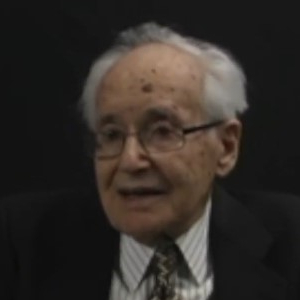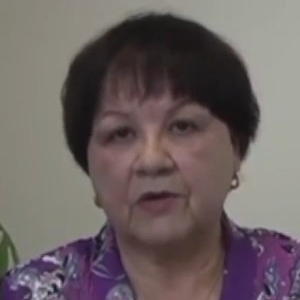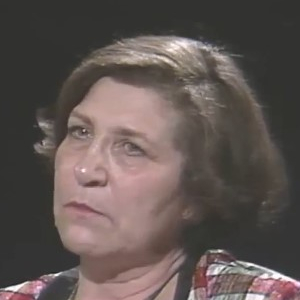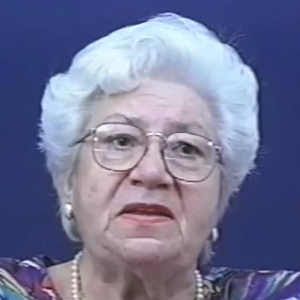Miriam Spinak
Miriam describes her work sorting through items that were taken from recently arrived prisoners. She recalls finding a baby in a suitcase and many prayer shawls.
Miriam Spinak (née Rotbard) was born August 3, 1919 in Warsaw Poland. Her parents died when she was young, so she lived with her brother until she was 16. She remembers Warsaw having an active and rich Jewish community, but grew up in a non-Jewish part of the city. During the Great Depression of the 1930’s Miriam stopped attending school because her brother could no longer afford it. Because she was no longer in school and wanted to help her brother make money, she started a dressmaking business.
Miriam was engaged before the war started and got married in January 1940. Before the war started in 1939, Miriam did not feel any antisemitism, and would often go dancing or to the cinema at night. At the beginning of the war Miriam and her husband worked in a factory. She remembers hiding in the basement with him to avoid being taken during roundups. Eventually they were forced to go to a roundup and were taken to Majdanek concentration camp. In Majdanek Miriam did hard labor in agricultural fields and often faced hard beatings. Her husband was killed in the crematoriums at Majdanek.
In August of 1943, Miriam was taken to Auschwitz-Birkenau, where she was kept until January of 1945. In Birkenau Miriam first worked on tearing apart shoes that were taken from people, then she had to sort through clothes from people who had been brought to the camp to find valuable items. Miriam then worked with chemists at Auschwitz keeping track of medications. Miriam was then transported to Ravensbruck where she stayed for one day before being forced on a death march to Taucha. She was liberated by American forces during this march.
After liberation Miriam returned to her brother’s apartment in Warsaw and found her niece’s family. Miriam met her second husband, Alexander, who was a Russian survivor in Warsaw, and they got married in 1945. She joined a kibbutz in Poland to try and get to Israel but was taken to a DP camp in Germany instead. Miriam stayed in the DP camp from 1946-1948 and had her daughter Annette there. She then went to Israel but had to leave shortly after she arrived because her family could not find an apartment.
Miriam and her family moved to Winnipeg in 1951 to join her niece. She originally planned to make money in Winnipeg to return to Israel, but ended up staying. Miriam worked in a factory until her husband found a job that made more money, then stayed home. She had her son Jerry in 1950, and stood as a trial witness in 1979 against the war crimes of Hermine Braunsteiner and Hildegard Lächert.
Miriam Spinak died in 2000, and her full testimony is part of the Canadian Collection of Holocaust survivor testimonies. It is preserved in the USC Shoah Foundation’s Visual History Archive and accessible through the Ekstein Library.
Miriam SpinakOnce I opened a suitcase and I found a child, a little baby.
Testimony to discover
-
Liberation

Paul Bard
Paul recalls when he was liberated. He describes his reaction seeing the American soldiers and how he felt in the moment.
Listen -
Escape

Regina Halpern
Regina describes her flight to Italy with her mother and brother. She distinctly remembers the conditions of the ship and what happened to her family ...
Listen -
Living under false identity

Renata Zajdman
Renata explains how she avoided being outed as Jewish. She describes how she was sent to Germany to work as a Pole, not a Jew.
Listen -
Camp

Roza Wolinsky
Roza recalls the deaths of girls she worked with in the camps. A significant moment she remembers is one dying in her arms and asking Roza to tell eve...
Listen
Educators & Students
Educational guides
Check resources